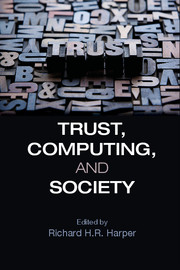Refine search
Actions for selected content:
2860 results in Computing and Society
Chapter 20 - Development Methods
-
-
- Book:
- Design and Development of Training Games
- Published online:
- 05 May 2015
- Print publication:
- 10 November 2014, pp 464-475
-
- Chapter
- Export citation
Chapter 17 - Game Review
-
-
- Book:
- Design and Development of Training Games
- Published online:
- 05 May 2015
- Print publication:
- 10 November 2014, pp 428-436
-
- Chapter
- Export citation
Chapter 15 - Game Review
-
-
- Book:
- Design and Development of Training Games
- Published online:
- 05 May 2015
- Print publication:
- 10 November 2014, pp 406-418
-
- Chapter
- Export citation

Trust, Computing, and Society
-
- Published online:
- 05 March 2014
- Print publication:
- 28 February 2014
Contents
-
- Book:
- Trust, Computing, and Society
- Published online:
- 05 March 2014
- Print publication:
- 28 February 2014, pp v-vi
-
- Chapter
- Export citation
References
-
- Book:
- Trust, Computing, and Society
- Published online:
- 05 March 2014
- Print publication:
- 28 February 2014, pp 339-356
-
- Chapter
- Export citation
7 - The Inescapability of Trust: Complex Interactive Systems and Normal Appearances
- from Part 2 - Conceptual Points of View
-
-
- Book:
- Trust, Computing, and Society
- Published online:
- 05 March 2014
- Print publication:
- 28 February 2014, pp 144-171
-
- Chapter
- Export citation
1 - Introduction and Overview
- from Dialogues - Trust, Computing, and Society: Introduction
-
-
- Book:
- Trust, Computing, and Society
- Published online:
- 05 March 2014
- Print publication:
- 28 February 2014, pp 3-14
-
- Chapter
- Export citation
Part 1 - The Topography of Trust and Computing
-
- Book:
- Trust, Computing, and Society
- Published online:
- 05 March 2014
- Print publication:
- 28 February 2014, pp 15-16
-
- Chapter
- Export citation
Index
-
- Book:
- Trust, Computing, and Society
- Published online:
- 05 March 2014
- Print publication:
- 28 February 2014, pp 357-362
-
- Chapter
- Export citation
Acknowledgments
-
- Book:
- Trust, Computing, and Society
- Published online:
- 05 March 2014
- Print publication:
- 28 February 2014, pp xi-xii
-
- Chapter
- Export citation
9 - Trust, Social Identity, and Computation
- from Part 2 - Conceptual Points of View
-
-
- Book:
- Trust, Computing, and Society
- Published online:
- 05 March 2014
- Print publication:
- 28 February 2014, pp 199-226
-
- Chapter
- Export citation
13 - Reflections on Trust, Computing, and Society
- from Part 3 - Trust in Design
-
-
- Book:
- Trust, Computing, and Society
- Published online:
- 05 March 2014
- Print publication:
- 28 February 2014, pp 299-338
-
- Chapter
- Export citation
Part 3 - Trust in Design
-
- Book:
- Trust, Computing, and Society
- Published online:
- 05 March 2014
- Print publication:
- 28 February 2014, pp 227-228
-
- Chapter
- Export citation
8 - Trust in Interpersonal Interaction and Cloud Computing
- from Part 2 - Conceptual Points of View
-
-
- Book:
- Trust, Computing, and Society
- Published online:
- 05 March 2014
- Print publication:
- 28 February 2014, pp 172-198
-
- Chapter
- Export citation
Dialogues - Trust, Computing, and Society: Introduction
-
- Book:
- Trust, Computing, and Society
- Published online:
- 05 March 2014
- Print publication:
- 28 February 2014, pp 1-2
-
- Chapter
- Export citation
Author Biographies
-
- Book:
- Trust, Computing, and Society
- Published online:
- 05 March 2014
- Print publication:
- 28 February 2014, pp vii-x
-
- Chapter
- Export citation
Part 2 - Conceptual Points of View
-
- Book:
- Trust, Computing, and Society
- Published online:
- 05 March 2014
- Print publication:
- 28 February 2014, pp 93-94
-
- Chapter
- Export citation
4 - Trust as a Methodological Tool in Security Engineering
- from Part 1 - The Topography of Trust and Computing
-
-
- Book:
- Trust, Computing, and Society
- Published online:
- 05 March 2014
- Print publication:
- 28 February 2014, pp 68-92
-
- Chapter
- Export citation
6 - The Worry about Trust
- from Part 2 - Conceptual Points of View
-
-
- Book:
- Trust, Computing, and Society
- Published online:
- 05 March 2014
- Print publication:
- 28 February 2014, pp 120-143
-
- Chapter
- Export citation
